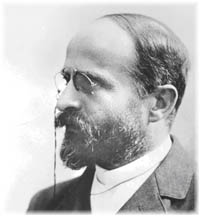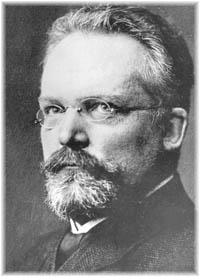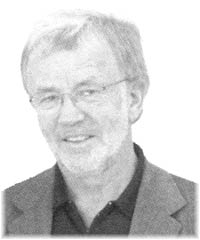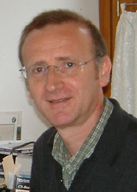A short sketch of the AEP history
The chair today referred to as 'Chair of General and Experimental Psychology (AEP)' has a long history. It dates back to the close of the 19th century, first as chair of 'Systematic Philosophy' and later as chair of 'Psychology and Philosophy'. Ten year after the institutional separation of philosophy and psychology, consequent upon the establishment, by Wilhelm Wundt, of the world’s first Institute of Psychology at Leipzig University in 1879, a novel appointment was made in Munich: a chair for Systematic Philosophy was for the first time offered to a scholar who regarded psychology as an empirical science: Carl Stumpf. That he was permitted at all to concentrate his teaching on psychology, rather than philosophy, was owing to the fact that philosophy was well covered by two other chairs, besides that of Carl Stumpf. As an independent organisational unit, the Psychological Institute was founded shortly after Carl Stumpf accepted the chair in 1889.
What follows is a historical sketch that briefly describes the work of those predecessors who are still cited today, because they have made important contributions to psychology, thereby enhancing the international reputation of the chair. A complete chronicle is not intended here (but may be found in '100 Years of Psychology at the Ludwig-Maximilian-University Munich', University of Munich, 1989).
Carl Stumpf (* 21.4.1848, † 25.12.1936): Professor from 1889 to 1894
 For Carl Stumpf, phenomenology remained the principal approach to psychology. He employed this method mainly to investigate the perception of acoustic stimuli, especially phenomena of music perception. Influenced by Franz von Brentano’s ‘act psychology’, he gradually dissociated himself from the ‘elementarism’ of Hermann von Helmholtz, which had conceived of perceptual phenomena as the mere sum of elementary sensations. In his main work, “Tonpsychologie” (“Psychology of Tones”, published in two volumes, Leipzig, 1883/1890), the concept of the phenomenological ‘whole’ emerges, to describe what is perceptually directly given and cannot be considered simply the assemblage of elementary sensations. This view can be regarded as a precursor of Gestalt Psychology, which was elaborated by his students (Köhler, Koffka, Wertheimer) later on in Berlin. At the same time, Stumpf can be regarded as one of the first scholars (besides Helmholtz) who conducted basic research into the psychology of music perception.
For Carl Stumpf, phenomenology remained the principal approach to psychology. He employed this method mainly to investigate the perception of acoustic stimuli, especially phenomena of music perception. Influenced by Franz von Brentano’s ‘act psychology’, he gradually dissociated himself from the ‘elementarism’ of Hermann von Helmholtz, which had conceived of perceptual phenomena as the mere sum of elementary sensations. In his main work, “Tonpsychologie” (“Psychology of Tones”, published in two volumes, Leipzig, 1883/1890), the concept of the phenomenological ‘whole’ emerges, to describe what is perceptually directly given and cannot be considered simply the assemblage of elementary sensations. This view can be regarded as a precursor of Gestalt Psychology, which was elaborated by his students (Köhler, Koffka, Wertheimer) later on in Berlin. At the same time, Stumpf can be regarded as one of the first scholars (besides Helmholtz) who conducted basic research into the psychology of music perception.
Theodor Lipps (* 28.7.1851, † 17.10.1914): Professor from 1894 to 1913
 In 1894, Theodor Lipps succeeded Carl Stumpf on the chair of Systematic Philosophy. In many publications, he strove to prevent experimental psychology, as conceived by Wilhelm Wundt, from becoming an autonomous program. Instead, he regarded psychology as the critical foundational discipline of the philosophy of knowledge and argued that psychology should rely on the method of introspection (as was typically the case in 19th century ‘psychology of consciousness’). In his conception, philosophy was to be replaced by psychology as the science (of the processes and contents) of consciousness, which is why he was accused of ‘psychologism’ by, for example, Edmund Husserl. Of a more lasting impact was Theodor Lipps’ work on psychological aesthetics, where he introduced the ambiguous notion of ‘empathy’ to explain the production and reception (perception) of works of art.nach oben
In 1894, Theodor Lipps succeeded Carl Stumpf on the chair of Systematic Philosophy. In many publications, he strove to prevent experimental psychology, as conceived by Wilhelm Wundt, from becoming an autonomous program. Instead, he regarded psychology as the critical foundational discipline of the philosophy of knowledge and argued that psychology should rely on the method of introspection (as was typically the case in 19th century ‘psychology of consciousness’). In his conception, philosophy was to be replaced by psychology as the science (of the processes and contents) of consciousness, which is why he was accused of ‘psychologism’ by, for example, Edmund Husserl. Of a more lasting impact was Theodor Lipps’ work on psychological aesthetics, where he introduced the ambiguous notion of ‘empathy’ to explain the production and reception (perception) of works of art.nach oben
Oswald Külpe (* 3.8.1862, † 30.12.1915): Professor from 1913 to 1915
 In 1913, Lipps was succeeded by Wundt’s former assistant Oswald Külpe. Külpe moved to Munich from Bonn (where he taught between 1909 and 1913), after founding at Würzburg University the well-known ‘Würzburg School’ (1894 to 1909) that yielded him a prominent position in the history of psychology. Along with Oswald Külpe came his assistant Karl Bühler to Munich, who had contributed considerably to the reputation of the Würzburg School. The Würzburg School was utterly dedicated to experimental methodology. Its was concerned mainly with the investigation of thinking, in particular, the issue whether thought processes are necessarily accompanied by mental images derived from previous perceptual experiences, in line with the sensualistic dogma of structuralism. Concerning this question, the findings of the Würzburg School were negative, which led them to propose the notion of ‘unanschauliche Bewusstseinsinhalte’ (i.e., ‘non-sensual contents of consciousness’, referred to as ‘thoughts’ by Bühler). During the two years that were left for Külpe in Munich before he died in 1915, he concluded a number of projects that he had begun earlier. After his death, Karl Bühler edited and published his “Lectures on Psychology” (1920).nach oben
In 1913, Lipps was succeeded by Wundt’s former assistant Oswald Külpe. Külpe moved to Munich from Bonn (where he taught between 1909 and 1913), after founding at Würzburg University the well-known ‘Würzburg School’ (1894 to 1909) that yielded him a prominent position in the history of psychology. Along with Oswald Külpe came his assistant Karl Bühler to Munich, who had contributed considerably to the reputation of the Würzburg School. The Würzburg School was utterly dedicated to experimental methodology. Its was concerned mainly with the investigation of thinking, in particular, the issue whether thought processes are necessarily accompanied by mental images derived from previous perceptual experiences, in line with the sensualistic dogma of structuralism. Concerning this question, the findings of the Würzburg School were negative, which led them to propose the notion of ‘unanschauliche Bewusstseinsinhalte’ (i.e., ‘non-sensual contents of consciousness’, referred to as ‘thoughts’ by Bühler). During the two years that were left for Külpe in Munich before he died in 1915, he concluded a number of projects that he had begun earlier. After his death, Karl Bühler edited and published his “Lectures on Psychology” (1920).nach oben
Wolfgang Prinz (* 24.9.1942): Ordinarius from 1990 to 1998
 Although the chair was never vacant for long in the years between 1915 and 1990, some of Oswald Külpe’s successors were associated with the National Socialistic regime and/or their contributions to psychology were of little lasting impact. After 1945, only few of the chair’s occupants achieved international resonance.
Although the chair was never vacant for long in the years between 1915 and 1990, some of Oswald Külpe’s successors were associated with the National Socialistic regime and/or their contributions to psychology were of little lasting impact. After 1945, only few of the chair’s occupants achieved international resonance.
This situation changed in 1990, when Wolfgang Prinz, who Professor of Experimental Psychology at the University of Bielefeld at the time, was appointed to the chair of “Psychology and Philosophy” at Munich University and Director of the Max Planck Institute for Psychological Research at the same time. Wolfgang Prinz’s main research interests were at first attention (contextual factors in visual search: a target attracting attention because it is registered as a ‘out-of-context’ or odd-one-out element); later on, his interests turned to the study of the coupling of perception and action (‘common coding’ theory: there is a common representational level for perception and motor action) and consciousness (Philosophy of Mind). In 1993, Wolfgang Prinz was awarded the prestigious Leibniz Price of the German Research Council (DFG) for his innovative contributions to psychology. Currently, he is Executive Director at the Max Planck Institute for Human Cognitive and Brain Sciences in Leipzig and Head of Department of Psychology.nach oben
Hermann J. Müller (* 4.6.1956): Ordinarius from 1997
 Since 2000, Prof. Hermann Müller is Professor (Chair) of General and Experimental Psychology at the Psychology Department, LMU Munich. His previous appointments include: from 1997-2000, Professor (Chair) of Experimental Psychology at the University of Leipzig (the Chair of the founder of academic psychology, Wilhelm Wundt); from 1992-1997, (Senior) Lecturer / Reader in Psychology at the School of Psychology, Birkbeck College (University of London), UK.
Since 2000, Prof. Hermann Müller is Professor (Chair) of General and Experimental Psychology at the Psychology Department, LMU Munich. His previous appointments include: from 1997-2000, Professor (Chair) of Experimental Psychology at the University of Leipzig (the Chair of the founder of academic psychology, Wilhelm Wundt); from 1992-1997, (Senior) Lecturer / Reader in Psychology at the School of Psychology, Birkbeck College (University of London), UK.
While he has a broad range of research interests, he is best known for his work on visuo-spatial attention, in particular, the functional dissociation and integration between voluntary and stimulus-driven mechanisms of attentional orienting. In his more recent work, he has demonstrated that attentional guidance in visual search and exploration is guided by short-term memory mechanisms that buffer appropriate – in particular, dimension-based – task settings and whose effects across time can be described in terms of an adaptive weighting dynamics (‘dimension-weighting account’). Currently, he is extending this approach to cross-modal processing (weighting of perceptual modalities), executive control (weighting of task settings), and motor action (weighting of effector systems).
Since 2000, Hermann Müller published, together with his colleagues, nearly 80 original research papers in major international journals of Experimental Psychology and Cognitive Neuroscience, as well as contributed nearly 20 articles to edited collections. He also co-edited several books and special-issue journal volumes. For his achievements in research, he was awarded a special LMUexcellent Research Professorship in 2007 and made a member of the LMUexcellent Center of Advanced Studies in 2008.
Besides holding his Research Professorship, he is the Director of the research-oriented M.Sc. program in “Neuro-cognitive Psychology (NCP)”; co-ordinator of “Research Area A: Neuro-cognitive Foundations” and member of the executive board of the Excellence Cluster “Cognition for Technical Systems (CoTeSys)”; founding member and member of the executive board of the “Munich Center for Neurosciences (MCN)”; and principal investigator and member of the scientific board of the “Graduate School of Systemic Neurosciences (GSN)”.

